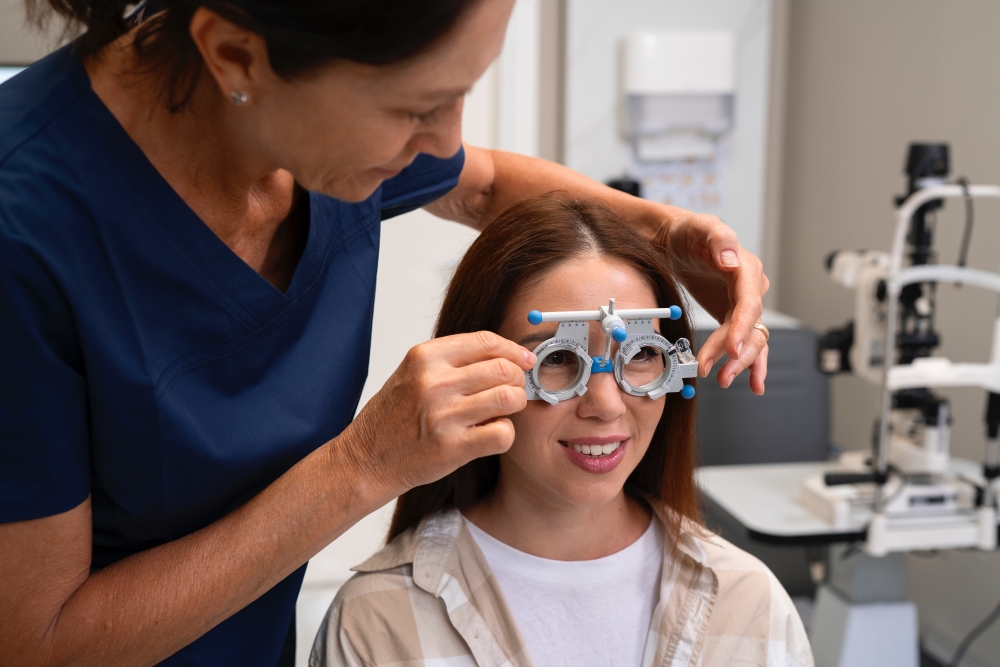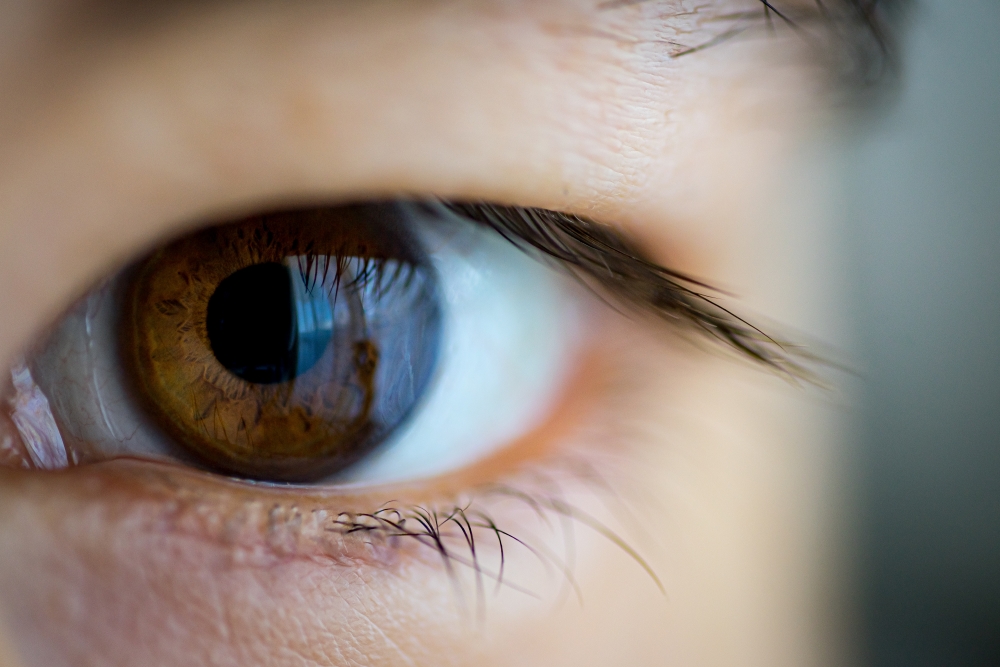Maintaining good eye health is essential not only for clear vision but also for our overall well-being. By adopting proactive habits and prioritising eye care, we can preserve our precious gift of sight and prevent common eye problems that can diminish our quality of life. In this article, we’ll explore practical tips and strategies on how to keep your eyes healthy, ensuring you enjoy a lifetime of clear, comfortable vision.
1. Eat a Balanced, Eye-Healthy Diet
Just as a balanced diet nourishes our bodies, it also plays a vital role in our eye health. Certain nutrients help support optimal eye function and protect against age-related eye diseases.
- Vitamins A, C, and E: These vitamins act as antioxidants, protecting the eyes from damage caused by harmful free radicals. Leafy greens like spinach and kale are excellent sources of vitamins A and E, while citrus fruits like oranges and grapefruits are packed with vitamin C.
- Omega-3 Fatty Acids: These essential fatty acids support the retina’s health and may reduce the risk of dry eyes. Incorporate oily fish like salmon and tuna, as well as flaxseeds and walnuts, into your diet to boost your omega-3 intake.
- Lutein and Zeaxanthin: These powerful antioxidants are concentrated in the macula, the central part of the retina responsible for sharp, central vision. Leafy greens, eggs, and yellow peppers are good sources of lutein and zeaxanthin.
Incorporating these eye-friendly nutrients into your diet can help reduce your risk of developing cataracts, age-related macular degeneration (AMD), and other vision-threatening conditions.
2. Practice the 20-20-20 Rule
In today’s digital world, many of us spend hours each day staring at screens, whether for work, entertainment, or staying connected. While digital devices offer undeniable convenience, prolonged screen time can take a toll on our eyes, leading to digital eye strain.
To combat this modern-day malady, embrace the 20-20-20 rule:
- Every 20 minutes, look away from your screen.
- Focus on an object at least 20 feet away.
- Hold your gaze for 20 seconds.
This simple practice gives your eyes a much-needed break from the constant near-focus demanded by screens. It helps reduce eye strain, fatigue, and dryness, promoting more comfortable and productive screen time.
3. Wear Sunglasses to Protect Against UV Rays
The sun’s ultraviolet (UV) rays can be harmful to our eyes, just as they are to our skin. Prolonged UV exposure can increase the risk of cataracts, macular degeneration, and other eye conditions.
To shield your eyes from the sun’s harmful rays, make sunglasses your constant companion, especially during daylight hours. Choose sunglasses that block 99-100% of UVA and UVB rays, ensuring adequate coverage for your eyes and the surrounding skin.
4. Take Regular Breaks from Screens
Prolonged screen use can lead to a range of eye-related discomforts, including:
- Digital eye strain
- Dry eyes
- Blurred vision
- Headaches
To minimise these effects, make sure to incorporate regular breaks into your screen time routine. Step away from your computer or put down your phone periodically to give your eyes a rest.
Additionally, practice conscious blinking to keep your eyes lubricated and consider adjusting your screen settings to reduce brightness and glare. These simple measures can help improve your eye comfort and reduce the strain associated with prolonged screen use.
5. Stay Hydrated
Believe it or not, staying hydrated is crucial not only for your overall health but also for your eye health. Dehydration can lead to dry eyes, a condition that causes discomfort, irritation, and blurred vision. Dry eyes can also make you more susceptible to eye infections.
To keep your eyes lubricated and healthy, make sure to drink plenty of water throughout the day. You can also increase your fluid intake through water-rich fruits and vegetables like watermelon and cucumber. If you experience persistent dry eyes, consider seeking dry eye treatment in Singapore.
6. Don’t Skip Your Eye Exams
Even if you feel your vision is perfect, regular eye check-ups are recommended for maintaining long-term eye health. Many eye conditions, such as glaucoma and age-related macular degeneration (AMD), can develop gradually without noticeable symptoms in their early stages. When you experience changes in your vision, the damage may have already occurred.
Comprehensive eye exams allow your eye care professional to detect early signs of eye disease, even before you notice any symptoms. This early detection is recommended for timely intervention and management, which may help slow disease progression and preserve your vision.
If you’re over 40, it’s advisable to schedule regular eye exams, even if you have no current vision concerns. As we age, our risk of developing age-related eye conditions increases. Regular check-ups at an eye specialist clinic can help identify these conditions early and ensure you receive appropriate care to maintain optimal eye health.

7. Avoid Rubbing Your Eyes
While it might be tempting to rub your eyes when they feel itchy or tired, this seemingly harmless habit can potentially affect your eye health. Rubbing your eyes can:
- Spread germs: Our hands come into contact with countless surfaces throughout the day, picking up bacteria and other microorganisms. Rubbing your eyes can transfer these germs to your eyes, increasing your risk of infection.
- Cause irritation: The delicate skin around your eyes is easily irritated. Rubbing can cause redness, swelling, and even tiny scratches on the cornea, the clear front surface of your eye.
- Worsen existing conditions: If you have dry eyes or allergies, rubbing can exacerbate your symptoms and lead to further discomfort.
Instead of rubbing, try using sterile eye drops to soothe irritation or alleviate dryness. If you experience persistent eye discomfort, consider seeking dry eye syndrome treatment in Singapore.
8. Use Proper Lighting When Reading or Working
Adequate lighting is essential for optimal vision, especially during tasks that require prolonged near focus, such as reading or working on a computer. Poor lighting can strain your eyes, leading to fatigue, headaches, and blurred vision.
To create an eye-friendly environment, ensure your workspace is well-lit, preferably with natural and artificial light. Avoid glare by positioning your light source so it doesn’t shine directly into your eyes or reflect off your computer screen. If you’re reading, make sure the light is directed onto the page and not shining in your face.
9. Wear Protective Eyewear
Our eyes are vulnerable to injury during various activities, whether we’re playing sports, working on a construction site, or tackling DIY projects at home. Wearing appropriate protective eyewear can help reduce the risk of eye injuries.
Safety glasses or goggles create a barrier between your eyes and potential hazards, such as:
- Flying debris: Dust, wood chips, metal shards, and other projectiles can cause serious eye injuries.
- Chemicals: Splashes from cleaning solutions, paints, or other chemicals can irritate or even damage your eyes.
- Harmful radiation: Welding, laser work, and other activities that emit harmful radiation require specialised eye protection to prevent vision damage.
Choose protective eyewear that is appropriate for the specific activity you’re engaged in and ensure it fits snugly and comfortably.
10. Quit Smoking
Smoking is detrimental to your overall health, and your eyes are no exception. Smoking has been linked to an increased risk of:
- Cataracts: Smokers are more likely to develop cataracts at a younger age than non-smokers.
- Macular Degeneration: Smoking is a major risk factor for age-related macular degeneration, a leading cause of vision loss in older adults.
- Optic Nerve Damage: Smoking can damage the optic nerve, which transmits visual signals from the eye to the brain, potentially leading to vision loss.
If you smoke, quitting is one of the best things you can do for your eye health and overall well-being. Talk to your doctor about resources and strategies to help you quit smoking successfully.
11. Maintain Good Hygiene for Eye Care
Practising good hygiene is essential for preventing eye infections and maintaining healthy eyes. This includes:
- Washing your hands: Always wash your hands thoroughly with soap and water before touching your eyes or handling contact lenses.
- Contact lens care: If you wear contact lenses, follow your eye care professional’s instructions for proper lens care. Replace your contact lenses as recommended and avoid sleeping in them unless they are specifically designed for extended wear.
- Eye makeup hygiene: Remove eye makeup thoroughly before bed to prevent irritation and infection. Replace eye makeup regularly and avoid sharing it with others.
Invest in Your Eye Health Today
Your eyes are a precious gift, and taking proactive steps to maintain their health is an investment in your long-term well-being. By incorporating these simple yet effective tips into your daily routine, you can reduce your risk of developing eye problems and enjoy a lifetime of clear, comfortable vision.
Remember, regular eye exams are essential to maintaining good eye health. Schedule an appointment with an eye specialist clinic in Singapore for comprehensive eye screening and personalised care. At Eyewise Vision, we’re dedicated to helping you protect your vision and enjoy the world around you.

